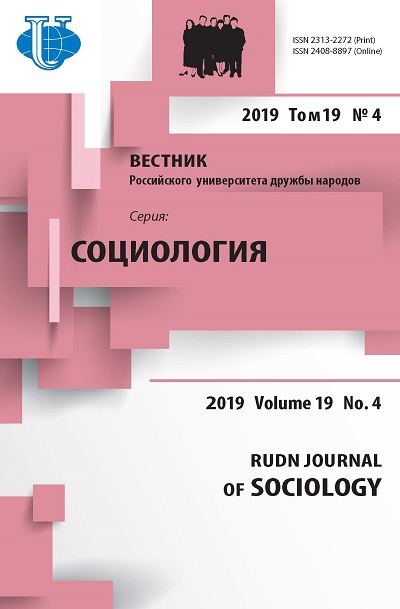The development of the social paradigm of eco-centrism: A philosophical interpretation of the sociological research in university
- Authors: Ivleva ML1, Ivlev VY.2, Kurilov SN3
-
Affiliations:
- RUDN University (Peoples’ Friendship University of Russia)
- Moscow State Technical University named after N.E. Bauman
- Moscow Power Engineering Institute
- Issue: Vol 19, No 4 (2019)
- Pages: 692-706
- Section: Surveys, experiments, case studies
- URL: https://journals.rudn.ru/sociology/article/view/22092
- DOI: https://doi.org/10.22363/2313-2272-2019-19-4-692-706
- ID: 22092
Cite item
Full Text
Abstract
The article considers the features of the youth’s attitudes to environmental issues and environmental crisis and the situation in environmental science - its features at the present stage of development, and explains the relevance of theoretical and practical studies of the environmental awareness and development of environmental culture. Two alternative interpretations of environmental issues are presented: alarmist and optimistic social stereotypes. Today, due to the qualitative and quantitative growth of information, the attitude to environmental issues is changing - it becomes more rational and balanced. However, the task of monitoring transformations of the public consciousness in relation to ecology is still relevant. The article presents the results of the sociological research conducted among students of undergraduate programs in engineering and humanities. The survey aimed at studying environmental values of the Russian youth and was conducted in 2019 in four Moscow universities: Moscow Power Engineering Institute, Moscow State Technical University named after N.E. Bauman, RUDN University, Moscow State Linguistic University. The survey results show that the traditional environmental education based on the increase of knowledge about nature does not lead to the change of environmental values and behavior in nature. The authors insist on introducing into contemporary ecology and informal ecological education the new social paradigm of eco-centrism that corresponds to the idea of harmonizing the relationship between man and nature and of a balanced, “calm” attitude of society to the environmental crisis. The authors also show the connection of psycho-ecology with environmental problems in public consciousness and the potential of this concept as a moral-ethical basis of the social paradigm of eco-centrism.
About the authors
M L Ivleva
RUDN University (Peoples’ Friendship University of Russia)
Author for correspondence.
Email: ivleva-ml@rudn.ru
доктор философских наук, заведующая кафедрой социальной философии
Miklukho-Maklaya St., 6, Moscow, Russia, 117198V Yu Ivlev
Moscow State Technical University named after N.E. Bauman
Email: vitalijivlev@yandex.ru
доктор философских наук, заведующий кафедрой философии
2nd Baumanskaya St., 5/1, Moscow, Russia, 105005S N Kurilov
Moscow Power Engineering Institute
Email: kurilov85@mail.ru
кандидат философских наук, доцент кафедры философии, политологии, социологии
Krasnokazarmennaya St., 14, Moscow, Russia, 111250References
- Vernadsky V.I. Biosfera i noosfera [Biosphere and Noosphere]. Moscow; 2004 (In Russ.).
- Glazachev S.N., Gagarin A.V. Ekologicheskaya kultura kak vershinnoe dostizhenie lichnosti na etape razvitiya informatsionnogo obshchestva [Ecological culture as the highest personal achievement at the stage of information society]. Vestnik Mezhdunarodnoy Akademii Nauk. Russkaya Sektsiya. 2013; 1 (In Russ.).
- God ekologii v Rossii: pedagogika i psikhologiya v interesakh ustoychivogo razvitiya [The Year of Ecology in Russia: Pedagogy and Psychology for Sustainable Development]. Sost.: M.O. Mdivani, V.I. Panov, Yu.G. Panyukova. Moscow; 2017 (In Russ.).
- Ivleva M.L., Kurmeleva E.M., Rudanovskaya S.V. Chelovek i obshchestvo v kontekste sovremennosti [Man and society in the context of modernity]. Voprosy Filosofii. 2018; 4 (In Russ.).
- Karopa G.N. Ekologicheskoe obrazovanie shkolnikov: vedushchie tendentsii i paradigmalnye sdvigi [Environmental Education of Schoolchildren: Leading Trends and Paradigmatic Shifts]. Minsk; 2001 (In Russ.).
- Kurilov S.N. Rol ekologii soznaniya v formirovanii razvitiya ekologii [The role of ecology of consciousness in shaping the development of ecology]. Rossiyskaya nauka v sovremennom mire. Moscow; 2018 (In Russ.).
- Myakinnikov S.P. Mirovozzrencheskie osnovaniya ekotsentrizma i ekomyshlenie [Ideological foundations of eco-centrism and eco-thinking]. Izvestiya TPU. 2005; 308 (1) (In Russ.).
- Nikolsky A.A. Velikie idei velikikh ekologov: Istoriya klyuchevykh kontseptsiy v ekologii [Great Ideas of Great Ecologists: A History of Key Concepts in Ecology]. Moscow; 2014 (In Russ.).
- Osipov V. Pervaya popytka sinteza ekotsentrizma [The first attempt of eco-centrism synthesis]. Zeleny Mir. 1994; 7 (In Russ.).
- Panov V.I. Psikhologicheskie aspekty ekologicheskogo obrazovaniya [Psychological aspects of environmental education]. Pedagogika. Vyp. 5. Moscow; 2015 (In Russ.).
- Peccei A. Chelovecheskie kachestva [The Human Quality]. Per. s angl. O.V. Zakharovoy. Moscow; 1985 (In Russ.).
- Ulyanova N.V. Ekologicheskoe soznanie i ekologicheskaya kultura, problemy i perspektivy [Environmental consciousness and environmental culture, problems and prospects]. Vestnik TGPU. 2007; 6 (In Russ.).
- Filosofskie idei V.I. Vernadskogo i sovremennost [Philosophical Ideas of V.I. Vernadsky and Modernity]. Vyp. 51. Tsenologicheskiye issledovaniya. Moscow; 2013 (In Russ.).
- Chardin de T. Fenomen cheloveka [The Phenomenon of Man]. Predisl. i komm. B.A. Starostina; per. s fr. N.A. Sadovskogo. Moscow; 1987 (In Russ.).
- Yasvin V.A. Formirovanie ekologicheskoy kultury ne svoditsya k ekologicheskomu obrazovaniyu [The formation of environmental culture is not limited to environmental education]. Na puti k ustoychivomu razvitiyu Rossii. 2006; 34 (In Russ.).
- Bartram T. Employee management systems and organizational contexts: A population ecology approach. Management Research Review. 2011; 34 (6).
- Biro A. Towards of denaturalized ecological politics. Polity. 2003; 35 (2).
- Brulle R.J. Environmental discourse and social movement organizations: A rhetorical perspective on the development of US environmental organizations. Sociological Inquiry. 1996; 66 (1).
- Gladvin T.N., Kennely J.J., Krause T.S. Shifting paradigms for sustainable development: Implications for management theory and research. Academic Management Review. 1995; 20 (4).
- Hanna M.D. Environmentally responsible management behavior: Is eco-centrism a prerequisite? Academic Management Review. 1995; 20 (4).
- Moore P. Pacific Spirit: The Forest Reborn. Terra Bella Publishers; 1995.
- Pindyck R.S. Risk and return in the design of environmental policy. Journal of Association of Environmental and Resource Economists. 2014; 1 (3).
- Rapport D.J. Economics and ecologically sustainable futures. International Journal of Social Economics. 1997; 24 (7/8/9).
- Repetto R. The Forest for the Trees? Government Policies and the Misuse of Forest Resources. Washington; 1988.
- Shin D-H., Park Y.J. Understanding the Internet of things ecosystem: Multi-level analysis of users, society, and ecology. Digital Policy, Regulation and Governance. 2017; 19 (1).
Supplementary files













